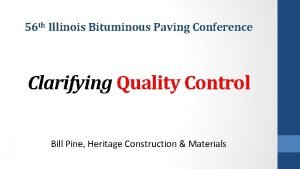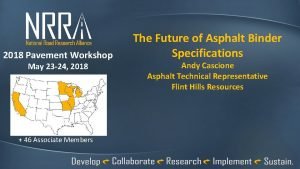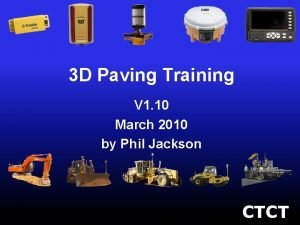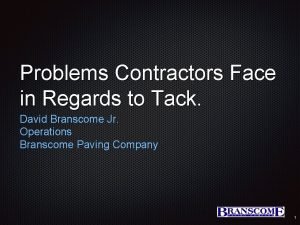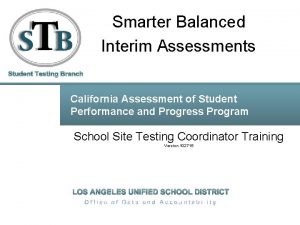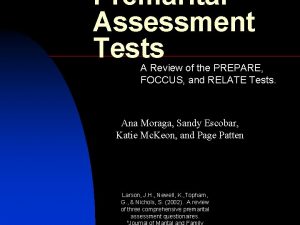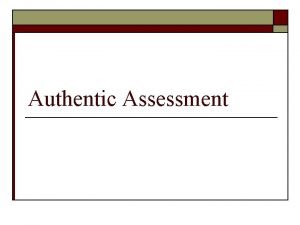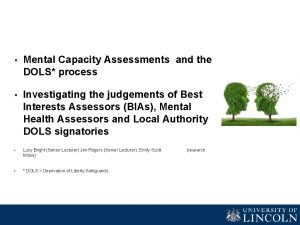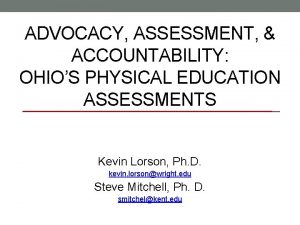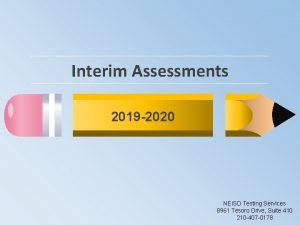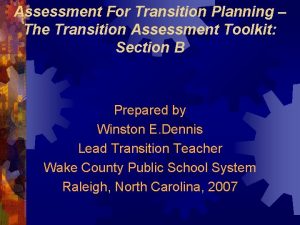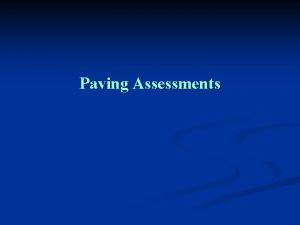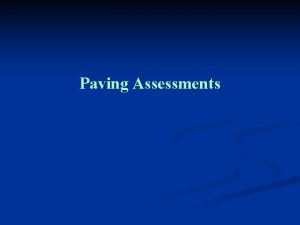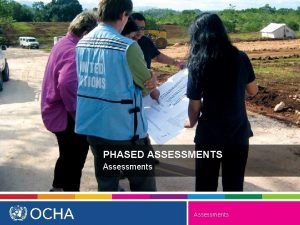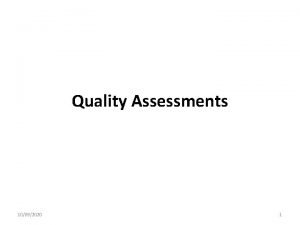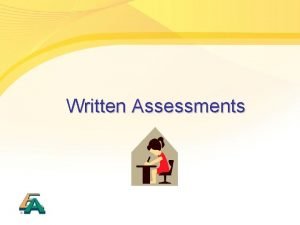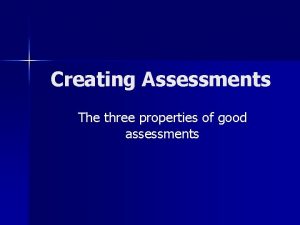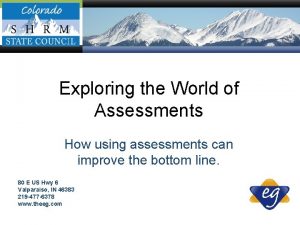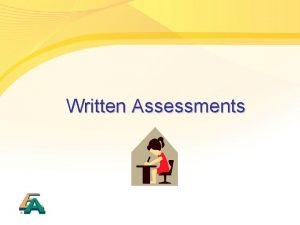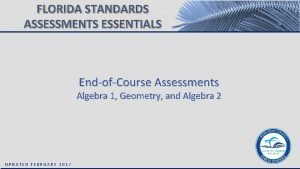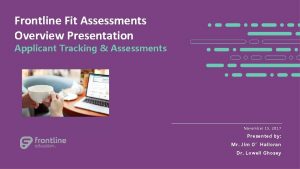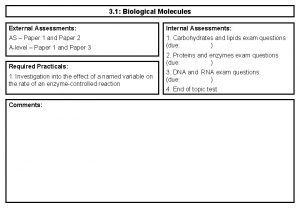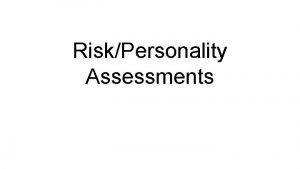Paving Assessments What is an assessment An assessment


























- Slides: 26

Paving Assessments

What is an assessment? An assessment is a method cities use to pay for projects directly benefiting a property

What is an assessment? An assessment is a method cities use to pay for projects directly benefiting the property What are front and end benefits? The front and end benefits are the portion of the total project cost that a particular property is being assessed, based on the size of the parcel.

How are assessments calculated? For paving projects, the front footage assessment rate is calculated by taking the total project cost divided by the total front benefit footage plus 1/3 the end benefit footage. The end footage rate is 1/3 of the front footage rate Sample Assessment Benefit Formula Assumed project cost of $100, 000 Front and end footages based on the diagram to the left Fronts 1, 200 feet Ends 1, 200 feet 1200(x) + 1200(1/3 x) = $100, 000 3600(x) + 1200(x) = $300, 000 4800(x) = $300, 000 X = $62. 50 per foot = Front benefit rate 1/3 x = $20. 83 per foot = End benefit rate

The front footage of a lot is the average width of the narrowest dimension of a lot. For a rectangular lot it simply average of the dimension of the front and back of the lot.

For lots with irregular shapes, such as some of the lots in culde-sacs, we calculate the front footage by taking the average of the chord distance at the front of the lot and the chord distance 140 feet back from the front.

Here is an example As you can see lots 9 – 13 have very different dimensions

Here is an example As you can see lots 9 – 13 have very different dimensions Lets take a closer look at lot 10

Here is an example As you can see lots 9 – 13 have very different dimensions Lets take a closer look at lot 10 To calculate the front footage, we take The average of the chord distances or 119. 84 + 51. 31 / 2 = 85. 58’

Once the footages are calculated, those footages are applied to the assessment process as seen in the following example

Lets assume this is the area of a subdivision we are going to work in….

Lets assume we are going to pave 1 st Street from 1 st Ave to 3 rd Ave. Which properties would get assessed for this?

The lots adjacent to the paving shown with the yellow would be assessed. In this case only front benefits. Front Benefit

Now lets add paving 2 nd Street from 1 st Ave to 3 rd Ave. Which properties would get assessed for this? Front Benefit

Again, the lots adjacent to the paving, shown with the yellow would be assessed. In this case only front benefits. Front Benefit

Lets continue, and say that we are going to pave 2 nd Ave from 1 st Street to 2 nd Street. can we assess the cost for this street? Front Benefit

Lets continue, and say that we are going to pave 2 nd Ave from 1 st Street to 2 nd Street. can we assess the cost for this street? Front Benefit In the past examples we assessed the adjacent properties for the paving, but in the case of 2 nd Ave it would not be fair to just assess the four lots adjacent to the street…. .

So we assess half the block on either side of the street. The lots highlighted with the blue bar. As mentioned earlier the rate for the assessment is 1/3 of the front benefit ra Front Benefit End Benefit

So we assess half the block on either side of the street. The lots highlighted with the blue bar. As mentioned earlier the rate for the assessment is 1/3 of the front benefit ra Front Benefit End Benefit Lets finish our example and pave 1 st Ave from 1 st Street to 2 nd Street…. .

Which properties get assessed for this street? Front Benefit End Benefit

Again half the block on either side of the street. Front Benefit End Benefit

Proposed Costs to the properties

Using the rates from before of $62. 50 front benefit, and $20. 83 end benefit. The lots with just a front benefit would be assessed $3, 750 $625 $1, 250 $5, 000 Front Benefit End Benefit $4, 375

The lots with just a full end benefit would be assessed $1, 250. The lots with half an end benefit would pay $625. $3, 750 $625 $1, 250 $5, 000 Front Benefit End Benefit $4, 375

The lots with a full front and end benefit would pay $5, 000, and the lots with a full front and half an end benefit would be $4, 375. $3, 750 $625 $1, 250 $5, 000 Front Benefit End Benefit $4, 375

Thank you! Are there any questions?
 Illinois bituminous paving conference
Illinois bituminous paving conference Sutter paving
Sutter paving Rowe asphalt paving
Rowe asphalt paving High desert paving
High desert paving D norman paving
D norman paving Rsa paving
Rsa paving Branscome paving company
Branscome paving company Aimsweb math benchmarks
Aimsweb math benchmarks Lausd interim assessments
Lausd interim assessments Premarital tests or assessments
Premarital tests or assessments Writing analytical assessments in social work
Writing analytical assessments in social work Traditional and authentic assessment similarities
Traditional and authentic assessment similarities Michigan literacy progress profile
Michigan literacy progress profile Outmatchapps
Outmatchapps Osde assessments
Osde assessments Six dols assessments
Six dols assessments What is physical fitness test in mapeh
What is physical fitness test in mapeh Ode physical education assessments
Ode physical education assessments Adult assessment
Adult assessment Cte technical skills assessments.azed.gov/student
Cte technical skills assessments.azed.gov/student Formative and summative assessments
Formative and summative assessments Strategi penilaian kurikulum 2013
Strategi penilaian kurikulum 2013 Staar interim assessments 2019-2020
Staar interim assessments 2019-2020 Common formative assessment examples
Common formative assessment examples Vdoe algebra readiness
Vdoe algebra readiness Formal vs informal assessment
Formal vs informal assessment Assessing strengths and weaknesses
Assessing strengths and weaknesses
